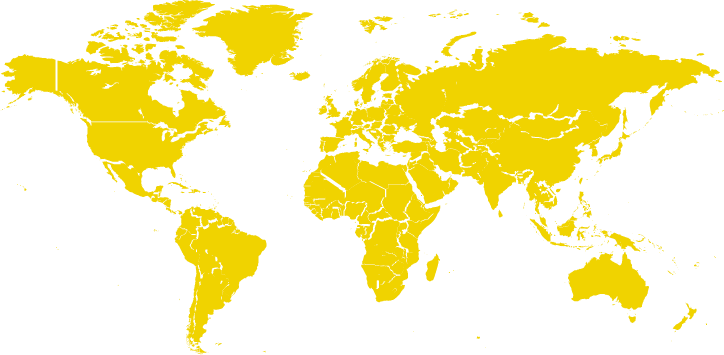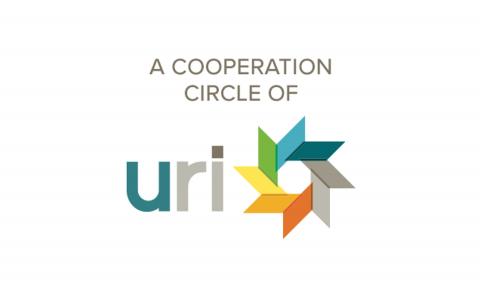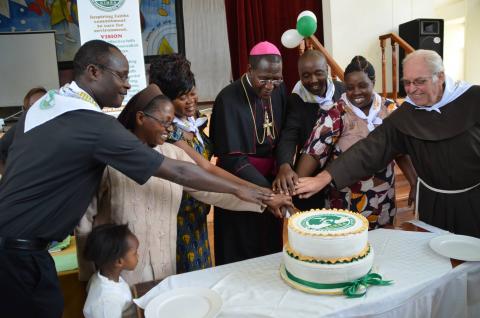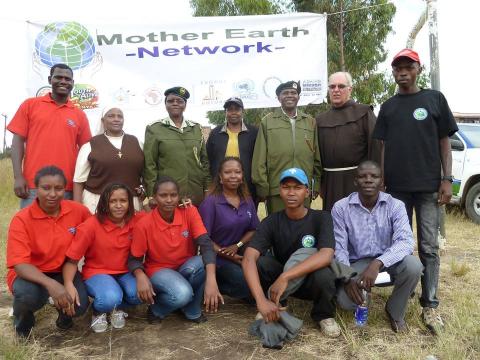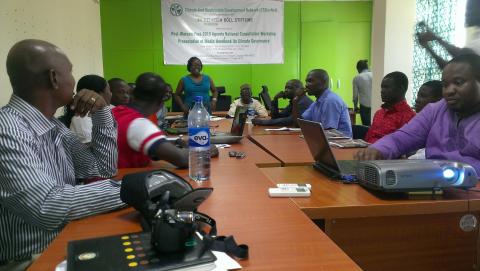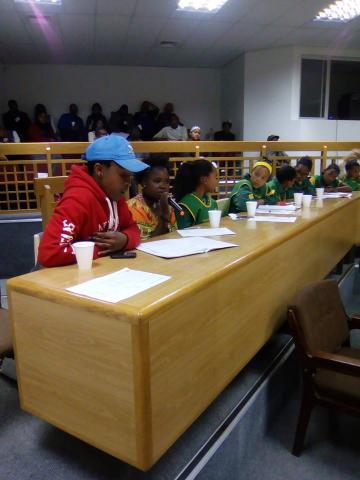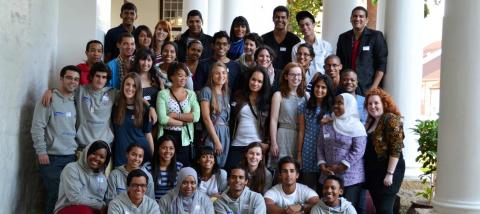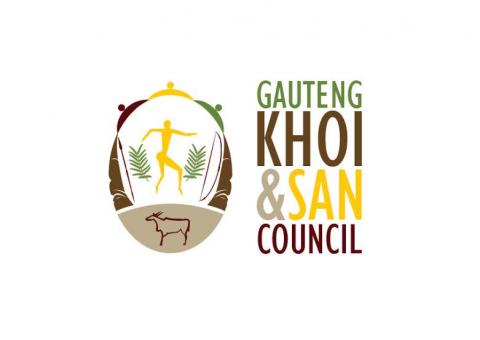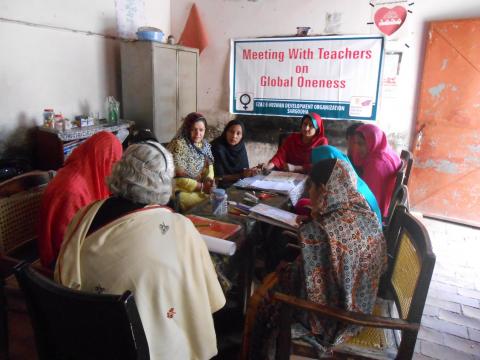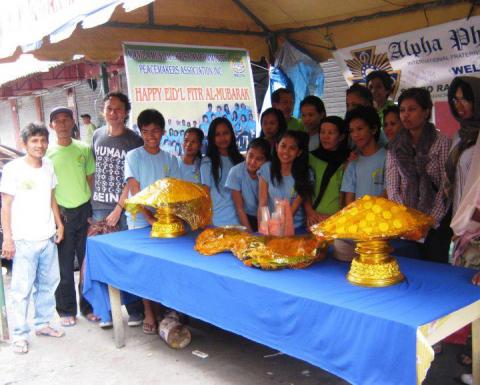We joyfully introduce 10 new Cooperation Circles accepted as members in February 2015! We have deep admiration for the work our new members are doing and for the work they plan to continue doing as part of the United Religions Initiative family.
Environmental issues, leadership and empowerment of youth, women and indigenous peoples are central to the work of these new CCs. It is also remarkable that the work of our new staff in Southern Africa is showing progress – we have a new record of three new CCs for this sub-region! Please join us in welcoming them to our global network.
Here are short descriptions of our newly approved CCs:

Rural Development Ministries (RUDEMI) - Maragoli, Kenya
Rural Development Ministries is a registered non-governmental organization that was legally registered in 1996. The main national office is in the County of Vihiga of Western Kenya. Their objectives are focused on whole-heartedly service to humanity. The organization is faith-based, with a focus on spiritual, social and economic development. The group is composed of Christians, Muslims, Baha’i and Hindus bringing peace in the world and sustaining God´s kingdom. They create projects that will generate income for helping low-income communities with their basic needs (e.g. food, clothes and shelter). They assist in building capacity of the people in their community so that they may be spiritually, mentally and physically fit.
Kenya Interfaith Network on Environment Action (KINEA) - Westlands, Nairobi, Kenya
KINEA was formed to pursue the African faiths commitment to care for creation. This network has ten members representing Muslim, Hindu, Seventh Day Adventist, Catholic and Protestant communities. KINEA actively engages in the implementation and actualization of Interfaith National Environmental Day, held on the 4th October every year. It has also been involved in capacity building workshops on sustainable farming, which has led to the establishment of farming demonstration sites. Together with URI-Africa, KINEA is organizing a conference on the theme of “The Role of Religion in Promoting Environmental Protection and Addressing the Issue of Climate Change in Africa,” earmarked for October 2015.
Mother Earth Network - Lagnata, Nairobi, Kenya
Mother Earth Network was formed to address environmental issues in Kenya by creating awareness, capacity building and conservation through tree planting. The group is a network of different organizations and institutions with environmental concerns. It is a faith-based organization that works closely in inter-faith relations to strengthen environmental conservation among different faiths in Kenya. They synergize efforts of religious groups through their tenets and spiritual beliefs to care for creation. So far, they have planted trees in schools and slum areas, as well as carried out capacity building workshops with youth and women. They have formed partnerships and collaboration with various likeminded organizations and groups, and also established a faith-based National Environment Day to be celebrated in Kenya on October 4th every year - a most memorable moment. Their plans for the future include expanding their tree planting and conservation initiatives to the neighboring countries of Uganda and Tanzania, as well as contributing to the achievement the vision of increasing the forest cover from 2% to 10%.
Climate and Sustainable Development Network (CSDEVNET) - Lagos, Nigeria
Climate and Sustainable Development Network of Nigeria (CSDEVNET) is a national coalition of civil society organizations, faith-based organizations, media, and individuals in Nigeria united by a common agenda for the environment and climate change through advocacy, education, public awareness and community mobilization. CSDEVNET is a member of Pan Africa Climate Justice Alliance (PACJA). This network, which was inaugurated on November 10, 2011 with headquarters in Ibadan, comprises over 50 member-organizations across Nigeria. This organization carries out activities that seek to advocate, implement, lobby and create awareness on the need to mainstream climate change and sustainable development into laws, policies and practices in the context of poverty reduction in Nigeria and within the Africa continent. CC members envision an environment free from the adverse impacts of climate change, with sustainable development, equity and justice for all. They also plan to reduce climate change vulnerability of poor communities in Nigeria through awareness and strengthening the capacity of Nigeria’s local communities and civil society to implement community based adaptation and mitigation projects.
Ennerdale Mini Parliament - Johannesburg, Gauteng, South Africa
The Ennerdale Mini Parliament Board was established to run and manage a youth organization for South African Youth from all religious and cultural backgrounds within the community of Ennerdale and its surrounding areas. It wishes to create an environment where youth are given the platform to share their opinions and perspectives, giving youth the centralized power to debate and discuss various issues affecting the youth in the area. It develops youth activism through civic education by unlocking passion to take initiative and play active roles in the development of their community.
Once a month, they conduct what is known as a “seating” for students from different schools as well as different organizations from their community and the surrounding areas. At each “seating,” a different topic is discussed and debated, topics that are chosen by the youth who are the key and main members. Youth give speeches, and various professionals address the given topic in presentations. Youth are also encouraged to come up with “take action” ideas, where they will do a presentation or some activity at their school after the seating. In this way, information flows down to the rest of the community, ensuring the achievement of their outcome and proposed goal.
Face to Face/Faith to Faith - Cape Town, South Africa
The focus of the group is to expose young people to others of the same age group who come from different backgrounds and belief systems, in order to engender understanding with the knowledge that, where there is understanding (a realization of a common goal and co-operation), there is a legacy of peace and a sense of making things better than we found them.
Tapping into the global network of youth development gives Face to Face/Faith to Faith members an opportunity to grow and learn, and also to identify constructive ways they can give back to the world.
One of the biggest areas of focus for this CC is the creation, through their camps and events, of a safe place where young people can comfortably express their questions without fear and receive honest, open answers. They believe that we cannot understand each other unless we are free to ask “awkward” questions, and we cannot help others to understand us unless we are able to face and answer the awkward questions in a spirit of compassionate dialogue.
The group’s biggest highlight so far was a visit to New York. The youth leadership has been selected to attend a Summer Camp Intensive in Holmes, New York, and the exposure to other faiths, other cultures and other foods was memorable. Another highlight has been being together in a safe space to dialogue, especially when there are religious and national tensions.
Getting to know people on a very deep level in a very short period of time is something they highly value. As members of URI, they plan to continue to bring a platform and create a safe space for people to ask their questions and to share in an environment of trust. They also plan to bring the lack of fatherhood into higher awareness and they want to be present for the fatherless children, helping them in some way. They will also work to continue to instill and develop leadership skills and show new leaders how, where and when they can take these skills back into their communities.
Gauteng Khoi and San Council - Johannesburg, Gauteng, South Africa
Gauteng Khoi and San Council was informally formed in 1994 and then formalized in June 2013. It has over 100 members from different religious communities and ethnic groups. Their hope and plan for the future is to gain constitutional recognition as an Indigenous people and enact the rights of the Indigenous to free their people economically, socially and politically. At community level, they plan to establish councils to look at the promotion and recovery of their cultures, religions, traditions, heritage and language. This CC also works to preserve and respect the environment and natural resources, and especially to retain Indigenous plant medicine and applications and to bridge build between ethical groups in South Africa to build cohesion, establish common and mutual respect for each other’s cultures. They are international as some tribes cross borders with Namibia, Angola, Botswana, Zimbabwe, Swaziland and Lesotho, but they have started in South Africa until they can go on to support the other tribes. Their objective is to protect the earth by addressing the root social and economic issues.

Ezaz-e-Niswan (Women's Honor) - Punjab, Pakistan
This CC was created to lift women up for realization of their womanhood and their rights, as well as to create a culture of justice, equality and peace. Their hope is to see empowered women, children and youth so that they have opportunity to experience equality, participate and contribute to all aspects of life, and achieve their fullest potential. They wish that all Pakistanis live in interfaith peaceful co-existence in the society. They believe that through non-violence and conflict prevention, the purpose of URI will be accomplished. Highlights of Ezaz-e-Niswan include the number of women gathering for meetings, seminars, training workshops and the support system among women, youth linkages and programs, the celebration of International Days and inter- and intra-city women conferences, networking and training sessions with other organizations, interfaith sports and tournaments, the recognition of achievements of women in the community.
Community Organization for People Empowerment (COPE Pakistan) - Punjab, Pakistan
COPE Pakistan (Community Organization for People Empowerment) is a non-political, non-profit, and non-sectarian organization. It is registered under the Society Act of 1860 of Pakistan. They are working on domestic violence against women in the Okara district, as well as peacebuilding education program with students from different faiths is working with 12 schools through basic education (working with children to get education in four target areas). They have celebrated national and international days like International Day of Peace, Women’s Day, and International Day Against Domestic Violence Against Women, and International Day Against Child Labor. COPE Pakistan has also celebrated Iftar parties, Eid Milan party with Muslims, and celebrate Christmas with different faith groups.
COPE Pakistan emerged to change the plight of women and children in a society where women feel insecure and have no freedom of expression and could develop themselves without any social and economic obstacles. Pakistan is a land of people who have longed and struggled for peace and non-violent culture. COPE Pakistan is establishing connections among different sects and religions to promote sustainable peace and social harmony. COPE Pakistan is working hard to bring visible change in the lives of women and children through rights based and developmental initiatives. It has special focus on organizing women to get united and raise their voice against an unjust structure, and decrease prejudice against women and religious minorities. COPE Pakistan has strong relationships and networking with other like-minded NGOs to perform collective efforts to achieve its objectives and goals.

Manila Muslim Christian Community Peacemakers, Inc. - Manila, Philippines
This group - formed by 80 elders and 120 youth from Christian, Muslim and Buddhist communities - are working to have integration among Filipino people. Their members are people who care to gather and pray for peace in the whole world. As members of URI, they will continue with activities that they have been doing, like encouraging jeepney drivers to become friends among themselves despite a history of quarrels due to competition (of getting passengers on the road). They have also been able to help those who intend to work overseas through technical trainings. They hope that what they have achieved over the years will impact the diverse people within their community in the City of Manila.
